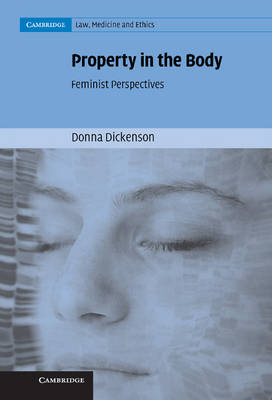
Property in the Body
Feminist Perspectives
Seiten
2007
Cambridge University Press (Verlag)
978-0-521-86792-4 (ISBN)
Cambridge University Press (Verlag)
978-0-521-86792-4 (ISBN)
- Titel erscheint in neuer Auflage
- Artikel merken
Zu diesem Artikel existiert eine Nachauflage
In response to the increasing commercialisation of the body, this book offers a wide-ranging synthesis of market developments in body tissue, together with an ethical approach to how we can deal with them and innovative models of regulating what has been called 'the new Gold Rush' in human tissue.
New developments in biotechnology radically alter our relationship with our bodies. Body tissues can now be used for commercial purposes, while external objects, such as pacemakers, can become part of the body. Property in the Body: Feminist Perspectives transcends the everyday responses to such developments, suggesting that what we most fear is the feminisation of the body. We fear our bodies are becoming objects of property, turning us into things rather than persons. This book evaluates how well-grounded this fear is, and suggests innovative models of regulating what has been called 'the new Gold Rush' in human tissue. This is an up-to-date and wide-ranging synthesis of market developments in body tissue, bringing together bioethics, feminist theory and lessons from countries that have resisted commercialisation of the body, in a theoretically sophisticated and practically significant approach.
New developments in biotechnology radically alter our relationship with our bodies. Body tissues can now be used for commercial purposes, while external objects, such as pacemakers, can become part of the body. Property in the Body: Feminist Perspectives transcends the everyday responses to such developments, suggesting that what we most fear is the feminisation of the body. We fear our bodies are becoming objects of property, turning us into things rather than persons. This book evaluates how well-grounded this fear is, and suggests innovative models of regulating what has been called 'the new Gold Rush' in human tissue. This is an up-to-date and wide-ranging synthesis of market developments in body tissue, bringing together bioethics, feminist theory and lessons from countries that have resisted commercialisation of the body, in a theoretically sophisticated and practically significant approach.
Donna Dickenson is Professor of Medical Ethics and Humanities at Birkbeck, University of London.
Acknowledgements; Preface; 1. Do we all have 'feminised' bodies now?; 2. Property, objectification and commodification; 3. The Lady Vanishes: what's missing from the stem cell debate; 4. Umbilical cord blood banks: seizing surplus value; 5. The gender politics of genetic patenting; 6. Biobanks: consent, commercialisation and charitable trusts; 7. The new French resistance: commodification rejected?; 8. Tonga, the genetic commons and No Man's Land; 9. Afterword; Bibliography; Index.
| Erscheint lt. Verlag | 19.4.2007 |
|---|---|
| Reihe/Serie | Cambridge Law, Medicine and Ethics |
| Verlagsort | Cambridge |
| Sprache | englisch |
| Maße | 158 x 236 mm |
| Gewicht | 484 g |
| Themenwelt | Medizin / Pharmazie ► Medizinische Fachgebiete ► Medizinethik |
| Studium ► Querschnittsbereiche ► Geschichte / Ethik der Medizin | |
| Naturwissenschaften ► Biologie | |
| Sozialwissenschaften ► Politik / Verwaltung ► Politische Theorie | |
| Sozialwissenschaften ► Soziologie | |
| ISBN-10 | 0-521-86792-4 / 0521867924 |
| ISBN-13 | 978-0-521-86792-4 / 9780521867924 |
| Zustand | Neuware |
| Informationen gemäß Produktsicherheitsverordnung (GPSR) | |
| Haben Sie eine Frage zum Produkt? |
Mehr entdecken
aus dem Bereich
aus dem Bereich
Die Geschichte eines Weltzentrums der Medizin von 1710 bis zur …
Buch | Softcover (2021)
Lehmanns Media (Verlag)
CHF 27,90
von der Antike bis zur Gegenwart
Buch | Softcover (2024)
C.H.Beck (Verlag)
CHF 16,80
Krankheitslehren, Irrwege, Behandlungsformen
Buch | Softcover (2024)
C.H.Beck (Verlag)
CHF 55,90



